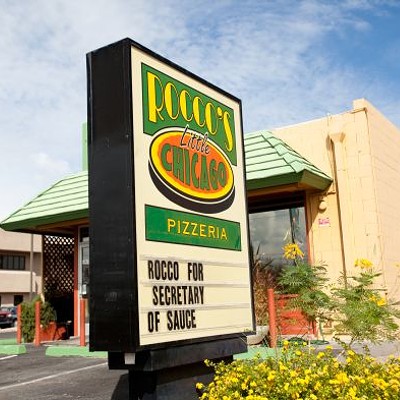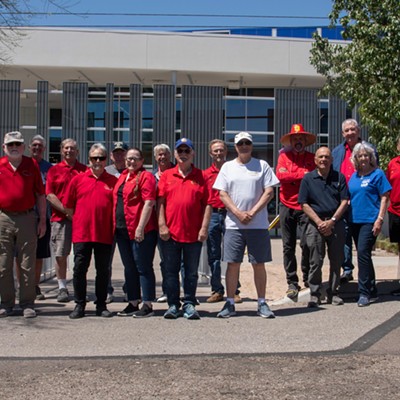TUSD Superintendent Roger Pfeuffer strongly believes the district has to quickly improve its technology capabilities.
"We don't have the capacity now," Pfeuffer declares. "It's an issue of upgrading the infrastructure so the power of new (Internet) programs can be delivered to students and staff in an efficient way."
"We're beginning to look at Web-based programs and streaming videos," Pfeuffer says, "but we won't be able to use them unless we increase" our technology capacity.
Guyton Campbell, director of TUSD's Technology and Telecommunications Services Department, lists several other areas where the district is deficient.
"The AIMS test will be done online," Campbell predicts, "and intelligent white boards have thousands of applications for teachers." However, Campbell points out that some TUSD schools presently have restricted access to this technology because of infrastructure limitations, and he believes more schools will eventually be affected.
To address these and other technological shortcomings, TUSD sought vendor proposals earlier this year prior to applying for federal E-Rate program grant funds (see "Communications Breakdown," June 8). Bids were solicited in several areas, including for Wide Area Network (WAN) services.
In a four-sentence paragraph, TUSD requested WAN bids which would provide a large amount of technology access to every district facility. Seeking "a WAN solution for their 117 sites providing bandwidth (access to technology) up to GB (gigabit) speeds," the district left details of the proposed network to the bidders' discretion.
In its reply, communication giant Qwest recommended a network costing $1.4 million annually, which did not supply gigabit speed access to approximately 45 TUSD facilities. This proposal was based on the firm's belief that these speeds were not necessary everywhere throughout the district and would require an ill-advised expenditure of money.
"Suggesting that an elementary school with 300 students (have) the same bandwidth requirement as a high school with 1,500 students would be irresponsible," representatives of the company later wrote. Instead, Qwest officials believe every student, not every school, should have the same technological access.
On Feb. 16, before the TUSD school board voted to select a vendor for WAN services, Pfeuffer said enhancing the district's technology capacity was "absolutely critical." He then told the elected officials: "I do not want some of our schools to have less ability to deal with technology than others."
Without naming names, Pfeuffer indicated Qwest submitted a proposal which supplied less technology access than he desired. On the other hand, the suggested vendor, Pfeuffer observed, "guaranteed one gigabit."
Based on Pfeuffer's opinion, and a recommendation from a bid-review committee made up of three TUSD staff members, the board supported a $3 million a year proposal submitted by Trillion Partners of Austin, Texas. Even though she expressed "significant reservations" about the process used to select Trillion, board president Adelita Grijalva joined the majority in a 4-1 approval.
After this vote, Qwest representatives filed a formal protest of the decision. Complaining about both the criteria used to select Trillion as well as TUSD's procurement process, the company requested reconsideration.
"If the district required a GB to every school," the protest states, "then the RFP (request for proposals) should have specified that requirement." The complaint also reiterates the Qwest submission would save taxpayers millions of dollars over a five-year period, since it was less than half the cost of the Trillion proposal.
TUSD staff members insist their job was to recommend to the school board which "approach best meets the needs of the district."
The Trillion WAN proposal does contain a range of options for TUSD, including technology speeds up to one gigabit at each facility, if that is what the district chooses.
The bid additionally shows two differently priced alternative technology networks. Both suggested network maps come with the disclaimer: "This design and attendant pricing are subject to change dependent upon a full, on-site survey of facilities, restrictions imposed by local regulatory authorities, modifications to network requirements initiated by customer needs and the availability of newer technologies."
This bid's ambiguity has led to questions about what exactly Trillion will supply to TUSD, and at what price. Company representatives declined to comment for this story.
Emphasizing that a gigabit of access will one day be needed at all schools, Campbell indicates the final details of the district's new technology network will be specifically defined once TUSD actually orders the system.
"In six months," he stresses, "the technology and organizational needs of the district will change what we implement. So the more flexibility we have (with the vendor company), the better for the district."
Campbell believes that type of flexibility is exactly what TUSD presently requires. "We're oversizing our potential (technology) capacity now," he says of the Trillion proposal, "but only paying for the capacity needed today."
To pay for these and other technology improvements, TUSD officials are hoping the district receives millions of dollars in highly competitive federal E-Rate funds. But if that grant money doesn't come through, Pfeuffer thinks the district will have to do the best it can, primarily with the less than $8 million in voter approved bond funds it currently has available.
"We'll continue to move forward," he says optimistically of TUSD's ride into the technology future, "with whatever resources we can garner."












